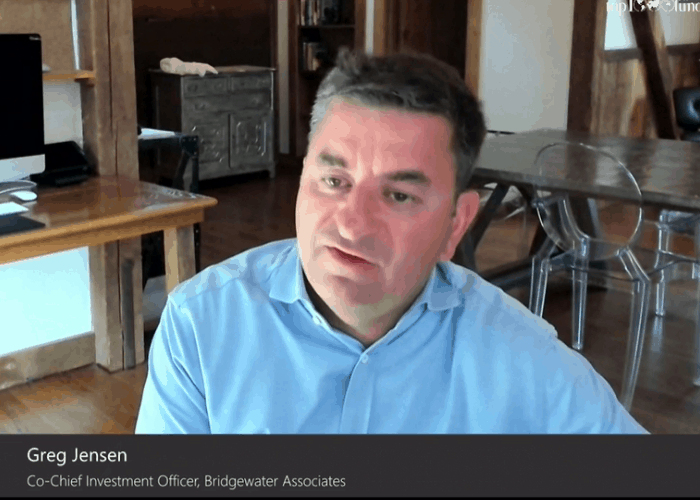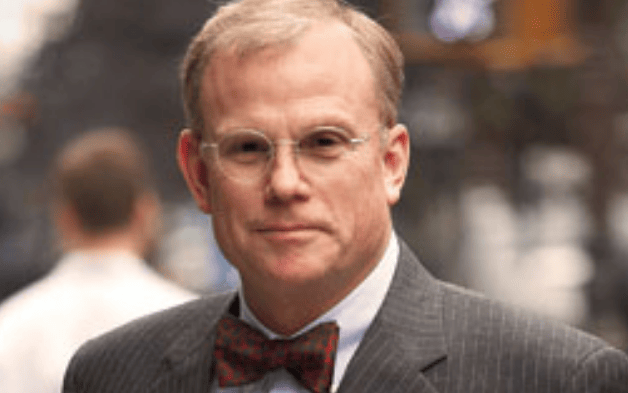Current fiscal and monetary policies are taking the world down a necessary, but dangerous path, according to co-CIO of Bridgewater Greg Jensen. He told investors asset allocations should focus on diversification, and assets that benefit from fiscal and monetary policy moving together.
COVID-19 will radically accelerate trends that were already underway, said Greg Jensen, co-CIO Bridgewater speaking at FIS 2020 Digital.
In a wide-ranging speech to delegates, Jensen said the trend in growing corporate profits was now “close to an end,” and that company profits would now grow in line with economies. Elsewhere, the massive “increase in debt relative to income” that has grown in recent years faces the reality of “promises being met.” He also flagged the dominant role of central bank policy, and new unknowns around the US dollar as a stable reserve currency and inflation.
Corporate power
Jensen told delegates that COVID-19 had dealt corporates “a big hit.”
The damage they have suffered will become apparent via holes in their balance sheet, despite the policy response. Over the past 40 years corporates have benefited from globalisation, de-regulation and a weakened labour force, however these trends are also coming to an end.
“We are getting closer to the end of a long trend in growing corporate power,” he said.
Jensen said that unsustainable trends around worker conditions are unlikely to continue because democracy will “push back” on unchecked capitalism. The ability for companies to “shop” for tax rates around the world or exploit labour via tapping the global labour pool, are coming to an end. “We are already seeing companies recognise that if they don’t move in this direction, they will be forced to,” he said. “If companies don’t act pre-emptively, it will happen to them.”
The trend to ever lower interest rates is also coming due, said Jensen. Low interest rates have caused debt to surge, leaving IOUs at “ten times income.” Jensen explained how in the wake of the GFC low interest rates have been followed by quantitative easing (QE). He said that QE is not as effective as interest rate policy and “reaches its limit” when it pulls the risk premium out of assets and money flows “back and forth” between cash and bonds.
Today, in a new phase, coordinated fiscal and monetary action has seen money go “out of the door” where it is spent in the real economy with possible inflationary consequences. Today’s challenges also come against the backdrop of a shifting political system as populism rises around the world and rules around regulation and tax change, he said.
Casting back over centuries, Jensen charted the rise and fall of empires. Back in the 1500s, China was the strongest power in world but then declined, usurped by the Dutch, the British and then the US – now declining against a surging China. He also referenced the different types of power empires hold from educational, military, and financial.
“Financial power peaks at the end of an empire, it’s the last thing to go,” he said referencing the dollar’s reserve currency status.
In this fast-changing world, returns on assets will be low, said Jensen. He warned that diversification is more important than ever, but also more difficult given that nominal bonds no longer play a diversifying role. He urged investors to understand the levers of monetary policy and how this will drive markets. Bonds used to be a defensive asset because bond prices would typically rise when central banks cut interest rates to try and bolster a struggling economy. He said now investors need to find new sources of diversification.
Jensen noted that a great deal of money has been “squeezed” into equities driving prices up, yet measuring the appropriate p/e ratio of a stock is difficult when interest rates are zero.
“We are seeing significantly higher p/e ratios than we used to,” he said. He said asset allocations will focus on diversification, and assets that benefit from fiscal and monetary policy moving together. In contrast, de-globalisation will mean that assets no longer move up and down as they did across the global economy, and that investors need instead to navigate new supply chains and “a more independent” Chinese currency.
Jensen concluded that current fiscal and monetary policies are taking the world down a necessary, but dangerous path. High debt levels that people can no longer pay out of income fuels populism. He said we could emerge from the crisis with lower debt levels and avoid inflation, however this required central banks to not lag in their response. In a final warning he said that markets today are priced to reflect policy makers “getting what they want” in an alignment that may not always be the case should inflation, inequality or delayed re-opening come to the fore.




